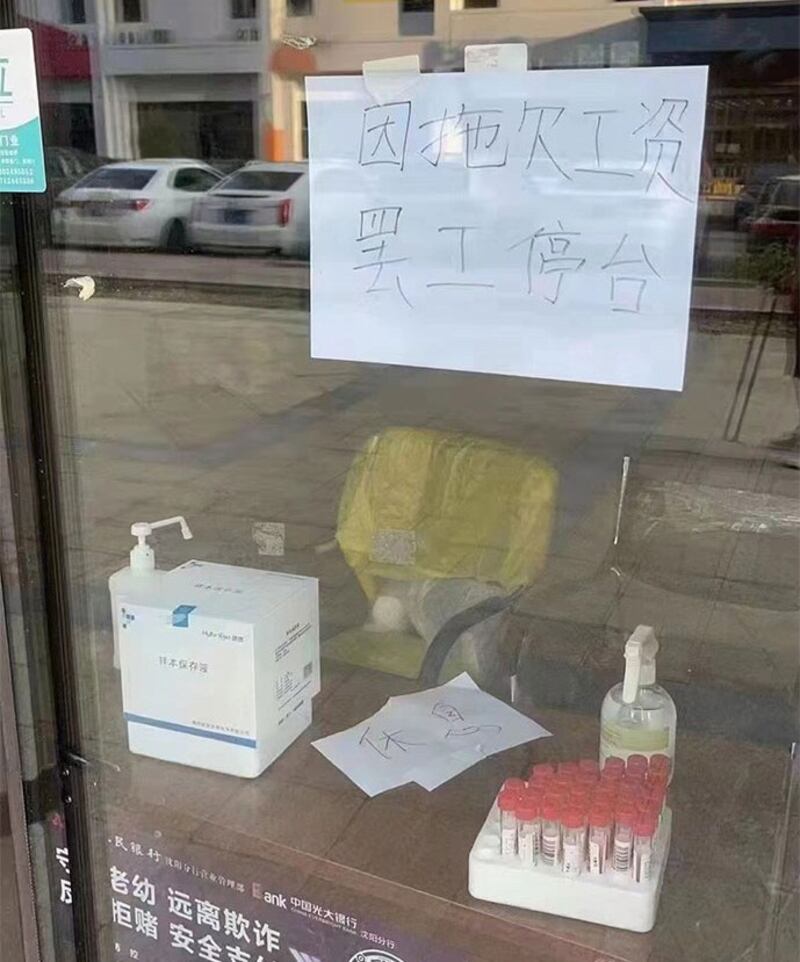Workers at test centers in northeastern China have been striking over unpaid wages in a nationwide COVID-19 testing industry that has expanded far beyond its sources of funding.
Unverified photos circulating on social media showed test centers in the northeastern city of Shenyang with notices in the windows reading "On strike; suspending [operations] due to unpaid wages," or "On strike, service suspended," with testing equipment visible in the background.
Social media posts from "dabai" white-suited COVID-19 enforcement and testing staff said they were later ordered to delete the photos.
A journalist familiar with the mass COVID-19 testing industry in China, who gave only the surname Li, said the claims of unpaid wages come amid massive profits for companies carrying out endless rounds of mass PCR tests across Chinese cities, in pursuit of ruling Chinese Communist Party (CCP) leader Xi Jinping's zero-COVID policy.
"My personal view is that the state is subsidizing these testing companies, while some local governments are also expanding their own PCR testing capacity," Li said.
"These more local testing [operations] aren't subsidized by the state, which is partly why they can't pay the white suits' wages."

Subsidies embezzled
Another possible reason was corruption, he said.
"Another issue is that the subsidies from the government are being embezzled by local government officials," Li told RFA. "There are many cases of this happening."
A resident of Shenyang who gave only the surname Wang said several of her neighbors had started out working as testers, but gave up due to the excessive stress of the role.
She suggested the amount of testing being done was out of proportion to the number of local cases.
"There's no longer an outbreak, and yet they're still forcing people to do PCR tests," Wang said.
"You have to show a negative PCR test certificate just to use public transportation," she said.
Jiangsu-based current affairs commentator Zhang Jianping said massive profits are being made from the zero-COVID policy.
"Zero-COVID is definitely having a lot of knock-on effects," Zhang said. "It has to be supported by large-scale PCR testing, which will inevitably cause problems of its own."
14 protests since March
Local media reports have typically referred to the white suits as "volunteers," but the role is generally paid, involving around 12 hours a day, with wages and various social subsidies due, as well as overtime pay.
The Hong Kong-based China Labour Bulletin has recorded 14 Covid-19-related worker protests since March, eight of which occurred in Shanghai during lockdown.
"Poor working conditions under strict lockdown measures led to protests not only by doctors, nurses, and white-clad pandemic workers, but also factory workers, taxi drivers and others," the group cited its Strike Map database as showing.
Social media videos have also shown dozens of white-clad pandemic workers engaged in street protests, demanding unpaid wages, in the Jingan district of Shanghai, CLB reported in late June.
Pandemic workers also clashed with police after reportedly being promised the right to quarantine in hotels before returning home, but instead being told to use temporary fangcang hospitals used for mass isolation of thousands of confirmed and suspected Covid-19 cases, it said.
"These types of incidents show that government pandemic relief measures do not go far enough in helping to alleviate the immense financial pressure felt by workers, small business owners and other citizens across China," CLB said.
It said Shanghai health volunteers are paid a subsidy of between 100-200 yuan per day, according to media sources.
The authorities sent more than 10,000 health workers to Shanghai from around the country in early April as lockdown measures intensified, the group said.
Translated and edited by Luisetta Mudie.
